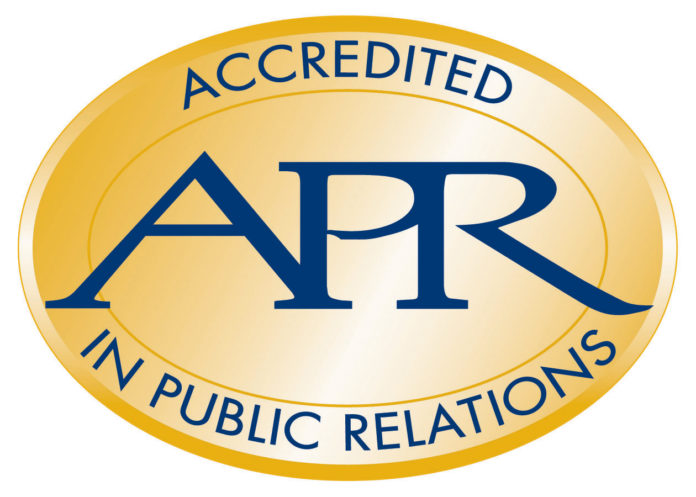By Tim Smith
APR is an acronym that may not be familiar, even to some members of the marketing communications community. It stands for Accreditation in Public Relations and is a mark of distinction for PR professionals. It’s bestowed by the Public Relations Society of America (PRSA), the largest professional association representing the industry.
An APR designation matters for several important reasons. It demonstrates to hiring managers and colleagues that you’re committed to the profession and have gone above and beyond the ordinary to gain knowledge, insight and awareness of best-practices. And it signifies that you’re bound to the highest ethical standards when it comes to honesty, fairness and integrity in your work.
Many mid-level PR professionals are at a point in their careers where they’re searching for ways to become more marketable or are hungry for professional development opportunities, but are wary of committing the time and funds to pursue an advanced degree.
Others have strong PR instincts and skills that are transferable to a career in public relations, but don’t have the principles and practice under their belts. I know, because I once walked in those very shoes.
Gaining accreditation involves
a four-step process
I was a political science and economics major in college, and it was later in my career, as I made my way into public afffairs and later PR, that I began looking for a way to become more grounded in the history and evolution of public relations. I found out about APR and thought the process of accreditation would be a good way to gain this knowledge.
The accreditation process was very helpful in learning the basics of the profession and, most of all, I enjoyed the camaraderie of my APR study class, which met weekly for a couple of months and featured many spirited debates about the state of the profession and the dissection of real-world case studies.
With all that’s happening in the world today, from tectonic shifts in media consumption and communications channels, to the advent of “alternative facts” and “fake news,” this would be a particularly exciting and helpful time to take part in an APR study course.
To gain accreditation, you must be a member of the Puget Sound Chapter of PRSA and then complete this four-step process:
Submit an applications for the Examination for Accreditation in Public Relations (fee of $385).
Write responses to a Panel Presentation Questionnaire. You will need to prepare a personal portfolio for this.
Sit for a Panel Presentation. The panel will evaluate your knowledge, skills and abilities in 12 specific areas that cannot be judged effectively in the Computer-Based Examination in Step 4.
Once you pass Step 3, continue to study and complete the Computer-Based Examination.
In order to apply for APR status, the PRSA requires at least five years of experience in public relations. The process is meant to enrich an existing foundation of public relations knowledge and work experience. It’s not meant to be a primer, more like a course that will provide a deeper understanding of what you’re already wired for.
Candidates also need to be good independent learners, as the bulk of the learning takes place on your own—although there’s an excellent online learning module that PRSA national makes available to candidates.
Those who have the time and energy, and who get excited at the thought of learning and growing in their career, should consider APR. There’s always going to be an excuse to put off a commitment to a project like APR accreditation. I highly suggest you make the time for yourself and your career and apply. And I trust you’ll find it as rewarding as I did.
 Tim Smith, APR, is EVP and group head, corporate and public affairs at Edelman. You can contact him at tim.smith@edelman.com. Visit prsa.org for more information on APR accreditation.
Tim Smith, APR, is EVP and group head, corporate and public affairs at Edelman. You can contact him at tim.smith@edelman.com. Visit prsa.org for more information on APR accreditation.






